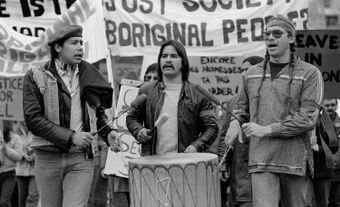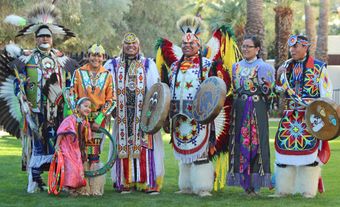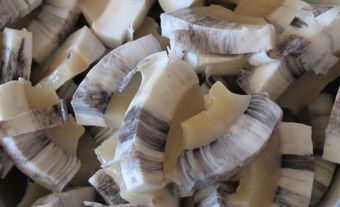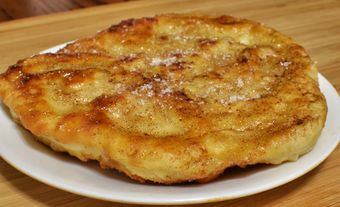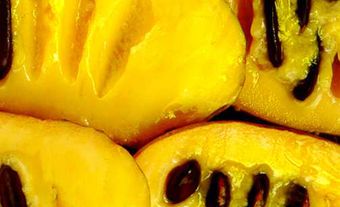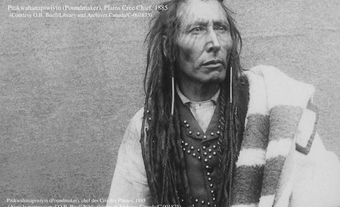
Early Life
Bertha Skye was born to a Cree mother and Métis father. Her paternal grandfather was a Scottish descendant of Simon Fraser; a fur trader and explorer credited with establishing the first English settlement in British Columbia. (See also Fur Trade in Canada.)
Skye grew up in the 1930s Great Depression. She saw people on her reserve suffering from lack of adequate food and shelter. Her parents wanted to provide a better life for their family, so they purchased land off-reserve where they grew their own vegetables.
Skye had seen children taken against their will and the wishes of their parents to go to distant residential schools. Since Skye’s parents moved off-reserve, she avoided residential school. (See also Education of Indigenous Peoples in Canada.)
Cooking Career
In 1947, an old army barracks was turned into the Prince Albert residential school. When she was 17 years old, Skye took a job as the school’s cook. She saw children as young as four years of age who were being mistreated. Skye did what she could to ensure the children had nutritious food. In a 2018 interview with Mohawk College’s podcast, The Extra Mile, she recalled, “…we fed them good, because I cooked and all our food was government inspected.”
Skye left the Prince Albert school to cook at the residential school in Norway House, Manitoba. She was appalled to learn that the children likened the school to the infamous Alcatraz prison in the United States, which was on an island so that none could escape. After a year there, she moved back to Prince Albert for a short while and then accepted a position as a cook in Northern Ontario at the Bishop Horden Memorial Residential School in Moose Factory.
Family Life and Other Work
It was while working at Moose Factory that she was married. Her husband Hubert Skye was a teacher at the residential school who secretly taught some of the students the Cayuga language. After two years at the school, she and her husband moved to Six Nations of the Grand River, near Brantford. Skye and her husband made it their permanent home. They would eventually have children and later became grandparents and great-grandparents.
Skye started her own catering and crafts business and performed with the Sky Dance Troupe. She would go on to serve on the board of the Six Nations Health Foundation.
Culinary Olympics
The international Culinary Olympics gathers the best food service professionals from around the world every four years. In the early 1990s, Canadian government officials chose Indigenous cooks to compete at the 1992 competition in Frankfurt, Germany. They surveyed Indigenous cooks from across Canada and Bertha Skye’s name came up.
Skye initially believed that the phone call inviting her to join Canada’s team was a hoax. However, she was eventually persuaded to attend a meeting at Toronto’s Royal York Hotel. She was surprised but proud to become a member of the first all-Indigenous culinary team in Canada. Her teammates included David Wolfman, Arnold Olson, Andrew George, and Brian Sappier. She was the only female cook on the team.
In October 1992, they competed against 14,000 cooks from 40 countries. Each day, they created a new display, presenting artifacts of a different Indigenous nation. The colourful and varied displays, and the poise with which the team members spoke of their pride in Indigenous cultures, caught the attention of the German media that glowingly reported on the team.
Skye and her teammates contributed many dishes to the competition’s various categories. They all used Indigenous recipes and ingredients. Skye was particularly proud of the leg of rabbit with wild rice dish.
They won the competition taking 11 medals, which was more than any other team. Among the two bronze, two silver and seven gold medals was a gold for Skye's Three Sisters soup. The corn, bean and squash soup has long been a staple of the Haudenosaunee people.
Elder in Residence
Bertha Skye has served as Elder in Residence at Sheridan College in Oakville, Ontario. In 2015, Skye was a founding member of Sheridan’s Indigenous Education Council. She has also served as Elder in Residence at McMaster University and Mohawk College, both in Hamilton, Ontario. As Elder in Residence, she advised administrators on Indigenous programs and how to better support Indigenous students.
Her warm and welcoming presence is welcomed by students. Skye invites students who visit her to work on beadwork or other Indigenous artistic endeavours, or perhaps to smudge or discuss Indigenous medicines. She finds those activities allow students to learn about their culture but also to relax and more openly discuss challenges they may be facing. To those who want to leave school, she stresses the importance of education to survive and thrive.
In 2019, Skye was among six inductees into the Hamilton Gallery of Distinction. Administered through the Hamilton Public Library, the award recognizes citizens who made important contributions to the betterment of the community.

 Share on Facebook
Share on Facebook Share on X
Share on X Share by Email
Share by Email Share on Google Classroom
Share on Google Classroom
